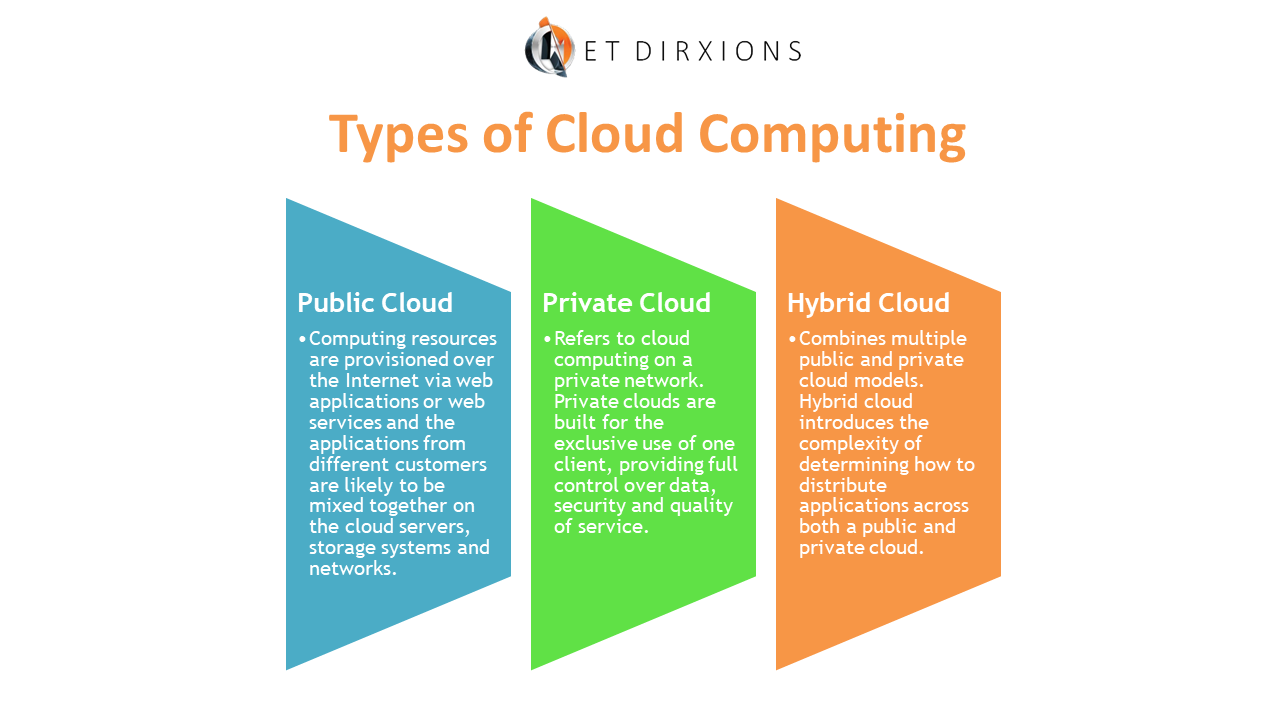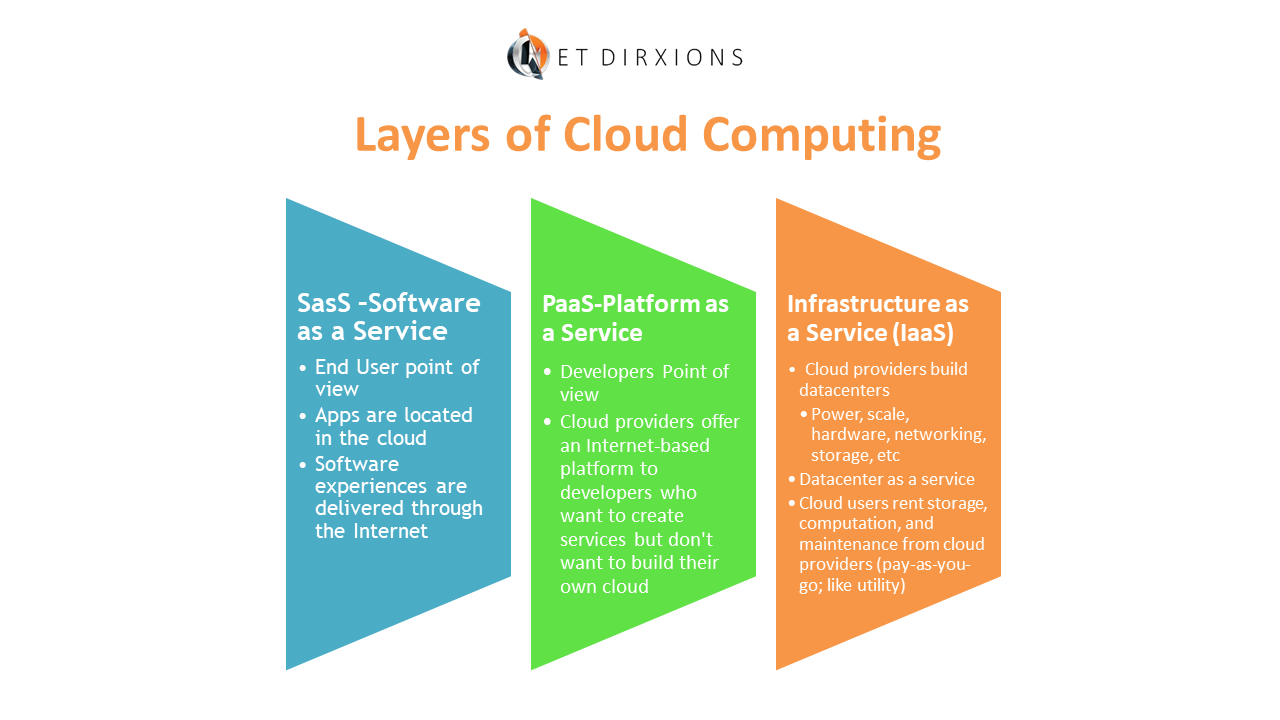SMB & Cloud Computing
The Benefits of Cloud Computing
Cloud computing saves SMB time and money by boosting productivity, improving collaboration, and promoting innovation. Here are benefits small and midsize businesses can realize from cloud computing solutions:
Reduced costs: Cloud computing often costs less than in-house IT infrastructure because it requires less hardware, power, and maintenance.
The cloud also eliminates some hardware costs, such as server maintenance and upgrades or new servers. Instead, users pay only for what they use. Rather than develop applications in house, users can access the cloud on a pay-per-use basis. This lets them scale down to a more manageable level when business is slow, and vice versa if business gets busier.
Reduced down time: Cloud computing lets businesses devote more time to revenue-generating activities. It also can help companies that have many remote employees, as this solution allows them to access the data they need without traveling to the office.
Faster recovery from disasters: Cloud computing enables organizations to use multiple data centers in case things go wrong with one site. If one location loses power or becomes otherwise unavailable, the replicated information can be accessed at another data center.
DEMYSTIFYING THE CLOUD IN LAYMAN’S TERMS
For several years, cloud technology has been one of the most talked about subjects in business technology circles. By now, most small-to-medium sized business (SMB) owners have heard that cloud computing is transforming the way their peers do business, and they’ve been inundated with talk of how the cloud enables small businesses to cut IT costs and operate more efficiently. But for many small businesses, the cloud is a pretty (ahem) nebulous idea, and they have a pretty wispy notion of its potential business value. For example. 54% of SMBs told Wakefield Research – a market research firm - that they’ve never used cloud technology.
The Cloud Can Be A Useful Part Of Your Business Model
You use the cloud and don’t even know it. Do you go to Amazon and create a wish list? Do you have an email account on Yahoo? That is cloud computing. All your emails are stored on Yahoo servers somewhere. They are on physical servers, of course, but they aren’t on your laptop. The advantage is that when you spill your coffee onto the laptop keyboard, you haven’t lost all your emails even if you never backed up your hard drive. ( If you haven’t, shame on you, by the way.)
Here is a simple analogy to explain how the cloud works and why it might be a very useful part of your business model. Picture the small, very cramped office space of a little start-up. You and a few coworkers sit in tight quarters with messy desktops buried in mounds of papers, files, and pizza boxes. There is absolutely no room for storage. (Throw the boxes out yourself. There are limits even to cloud technology) It will be a long time until you can afford a larger office space. Your building manager offers to rent you an empty file cabinet in the basement. Although the basement space is shared with other tenants, only you and your team have keys to this locked cabinet where you will store all those piles of paper. Your rent is relatively cheap compared to other tenants, since you’re only paying for the cabinet, and not the larger lockers they have leased.
Suddenly, those once covered desktops are clean, leaving space to work. More importantly, the papers are all nearby, each of you has a key, but they are safe from everyone else in the building or outside. They are also safe from spilled coffee and pizza crumbs. You’ve avoided the dramatic jump in fixed costs required to find bigger office space, when all you needed were several feet of filing cabinets. Even better, the money saved is put back into the core goal of providing a product or service to a customer.
The cloud does the same thing. You rent only the space you need, it is safer from hackers than your on-site server will ever be, secure from thieves, and protected from accident prone employees. Unlike the rest of us, cloud service providers don’t have coffee cups near their keyboards or forget to do monthly backups. In short, the cloud provides scalable storage without large incremental leaps in fixed costs you really can’t afford.
Tech Quick Tips - Understanding Cloud Technology
1. What is the Cloud?
The cloud is virtual and therefore does not require any hardware of your own to deliver a service. Cloud technology can deliver that service to you, without having to install anything or have it on a server at your business. This is something that you can access remotely, or via the Internet through your web browser. Offsite, secure third party data centers manage all of your cloud data so that you can access it at your convenience.
2. You May Already be Using the Cloud
Are you using Gmail? Amazon Music? A Kindle? Dropbox? These are all cloud services that store the data you access. All you have to do is log in to their servers to get what you need. If you use an Apple iPhone or iPad, then you're familiar with the iCloud service, the cloud technology that allows you to sync and upload your photos and contacts.
3. Why Use the Cloud?
The cloud is convenient for accessing and backing up data no matter where you go. With it, you can access servers anywhere, rather than just locally from your office. This allows you to perform your job duties at home and on the go! There is no need to carry around (and risk losing) USB drives with sensitive information on them. If you lose that USB drive, then your files are gone forever. If you back them up to the cloud or store them there, however, you can easily retrieve that data.
4. Why is the Term “Cloud” Used?
There is both a literal and figurative meaning here. Have you ever laid down in the grass, and looked up at the clouds in the sky? Oh, look, an elephant! A boat! Oh nice, a dinosaur! But the person next to you may not see the same shapes. They may see a sandwich, a skyscraper or an airplane in the clouds instead. The possibilities are almost endless, and not everyone has the same vision. Cloud technology is similar, offering a plethora of possibilities to help support and scale your business. Also, clouds are generally always above us. Just head on up, and grab whatever you need on-demand. The sky is always accessible.
So, you can store and access files in the Cloud. You can use cloud-hosted applications, like Gmail and GoogleDocs. Finally, the cloud gives you access to your data anywhere with a network connection. This all sounds great, right? It is, but as with anything on the Internet, these services need to be used responsibly. Is your IT services provider helping to manage this?












